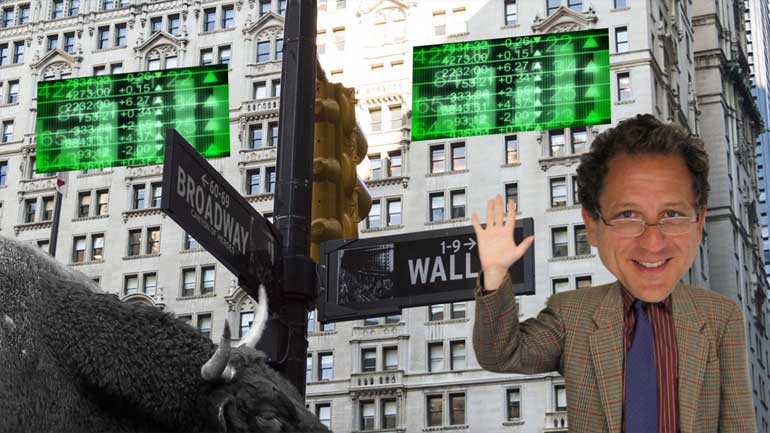ShmoopTube
Where Monty Python meets your 10th grade teacher.
Search Thousands of Shmoop Videos
Personal Finance Videos 520 videos
What is bankruptcy? Deadbeats who can't pay their bills declare bankruptcy. Either they borrowed too much money, or the business fell apart. They t...
What's a dividend? At will, the board of directors can pay a dividend on common stock. Usually, that payout is some percentage less than 100 of ear...
What rights does a public stockholder have? Common shareholders elect the board of directors. They vote. They have the right to quarterly financial...
Finance: What is the "Time Value" of Money? 21 Views
Share It!
Description:
What is the "time value" of money? A dollar today is worth more than a dollar tomorrow. You can always invest your cash and earn a return.
- Social Studies / Finance
- Finance / Financial Responsibility
- College and Career / Personal Finance
- Life Skills / Personal Finance
- Finance / Finance Definitions
- Life Skills / Finance Definitions
- Finance / Personal Finance
- Courses / Finance Concepts
- Subjects / Finance and Economics
- Finance and Economics / Terms and Concepts
- Terms and Concepts / Accounting
- Terms and Concepts / Company Management
- Terms and Concepts / Insurance
- Terms and Concepts / Metrics
- Terms and Concepts / Regulations
- Terms and Concepts / Tax
Transcript
- 00:00
Finance, a la Shmoop. [title page]
- 00:03
What is the time value of money?
- 00:05
Hmm...
- 00:06
Well, think of money--the money you'd be investing--as sitting in a pile on a continually moving [money on escalator]
- 00:11
escalator with checkpoints every day.
Full Transcript
- 00:13
Well, this is the investing escalator, and this particular escalator is the escalator
- 00:18
of safe bonds. [safe bond bag and escalator]
- 00:20
It moves at a slow, steady pace, but each week, the bag gets slightly bigger, and there
- 00:25
are no holes in the padding--no cliffs it will send you over. [bag grows]
- 00:28
All right, now this is the escalator of risky equities. [equity escalator shown]
- 00:32
All right, hang on tight.
- 00:34
Yeah. So equities are things like stocks, and we're focused here on risky ones, like just IPOd
- 00:40
companies. They could be Yahoo in 1996, which whent up 50+ times over its IPO price, or it could [Yahoo growth chart]
- 00:48
be Crap.com, which IPOs and then went bankrupt three years later. [toilet flushes]
- 00:53
So, why does all this matter on the escalator?
- 00:55
Well, because if you zoom out on equities, you'll see that over long periods of time--like
- 01:00
decades--money grows, and well, it grows a lot. [growth chart]
- 01:03
Over time, the stock market has almost always produced a very nicely positive investment [money baby grows]
- 01:08
return.
- 01:09
It might be a year from now that you see significant returns, or it might take ten years, but you'll [person gets money back]
- 01:13
be headed in the right direction if you wait long enough for the golden love.
- 01:17
All right, well to illustrate, check out the S&P 500 chart right here. [chart shown]
- 01:22
Okay...
- 01:23
Well, you can see there wasn't a whole lot of action from 1950 to the mid-1980s right
- 01:28
there, then the 70s here is flat--nothing happened. [growth illustrated]
- 01:33
Dividends grew a whole lot, though.
- 01:34
And then when Reagan came to office, all kinds of good things started happening to the sock [Reagan appears]
- 01:39
market.
- 01:40
Look at 1980, and then blam, it cranks up through 1988.
- 01:43
And then, we get the mid-90s.
- 01:45
Greatest bull market in history, with the Dot com bubble exploding right there, and
- 01:49
things went down a whole lot... [events illustrated]
- 01:50
And then things came back, and then they went down a lot, and wow, look at it in 2017, it's cranking.
- 01:57
So yeah, welcome to a quick tour of the stock market.
- 01:59
That's kind of how things hang, but you can tell from 1950 to today, it's a nice, sloping,
- 02:04
upward line there. [person demonstrates stock market]
- 02:05
Yeah, that's the stock market.
- 02:07
And go back to the 1970s thing right there, where everything was flat.
- 02:11
Well, the stock prices back then didn't have to go up a ton for investors to be handsomely [investors paid in dividends]
- 02:17
paid for their invested capital.
- 02:19
They got dividends for them.
- 02:20
The point of the escalator is to highlight time, here.
- 02:22
That's the ding-ding-ding sound you keep hearing in the background as each day passes and another [money plant watered]
- 02:27
iteration of safe bond compounding happens, or dividends get paid, or equities grow in
- 02:34
value over time.
- 02:35
All right, well why is time important? [clock ticks]
- 02:37
Because like oh so many cliched Wall Street movies claim, time really is money.
- 02:43
The more time that passes, the more your net worth swells, usually. [investment grows]
- 02:47
It's how the already rich get richer.
- 02:50
Well, the amount of risk and time you have to lock up that investment determines which
- 02:53
kind of escalator you're going to put your investment on, but it can always grow, so [people choose escalator]
- 02:57
there's always value in the time you lock up your money.
- 03:01
Remember that fact the next time a buddy asks to borrow a grand and somehow doesn't expect [person loans money]
- 03:05
to pay interest on that thousand bucks for a year.
- 03:08
The stock market has averaged going up about nine or ten percent a year for a century and
- 03:12
change, and the bond market about half that much, because it carries a lot less risk. [upward trends demonstrated]
- 03:16
So duh, it carries less reward.
- 03:18
All right, well the grand you loaned your pal for a year could have given you a free
- 03:21
50 bucks in interest in the bond market, and maybe a lot more if you'd think about investing [friend pays interest]
- 03:26
it in the equity market... 10, 15, 20% for a good year.
- 03:30
So yeah, the trick is to take the money you make and then let time put that money to work [money works for time]
- 03:34
for you.
- 03:35
The best part about having your money work for you is that you don't have to give it
- 03:39
paid sick leave. [money is pretty sad in this harsh work environment]
Related Videos
GED Social Studies 1.1 Civics and Government
What is bankruptcy? Deadbeats who can't pay their bills declare bankruptcy. Either they borrowed too much money, or the business fell apart. They t...
What's a dividend? At will, the board of directors can pay a dividend on common stock. Usually, that payout is some percentage less than 100 of ear...
How are risk and reward related? Take more risk, expect more reward. A lottery ticket might be worth a billion dollars, but if the odds are one in...





































































































